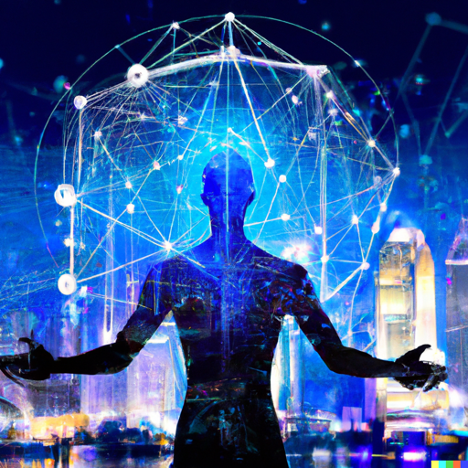 Image generated by DALL-E for Brian E. Moore
Image generated by DALL-E for Brian E. Moore
AI and the Dawn of Accelerated Productivity: A Vision of Our Bright Future
August 10, 2023By: Brian E. Moore
I believe Artificial Intelligence (AI) will prove to be the most important discovery of our lifetimes. It stands poised to become the next monumental revolution in human history, following the footsteps of the Agricultural, Scientific, Industrial, and Digital Revolutions. AI has already made a profound impact on our world, and its potential is only beginning to be realized. Here are my thoughts on the subject of AI and its role as a catalyst for enhanced productivity and economic growth.
Understanding AI and Its Relevance
AI, also known as Artificial Intelligence, has emerged as a transformative force. Starting with the groundbreaking success of the generative AI, ChatGPT-3, released by OpenAI in November 2022, to the present, a mere 9 months later, where dozens of free and user-friendly AI models exist, AI is poised to shape our lives in major ways. Many large US technology companies are actively developing their own AI models, while consulting firms are investing billions and hiring hundreds of thousands of workers, to harness the business potential and cultivate best practices for these innovative tools.
AI is already improving worker productivity within organizations that have embraced this technology. Other research has shown that last-generation AI generated productivity gains in varying tasks averaging 66%. Already, people with no prior training have used AI to create smartphone apps, websites, games, music, movies, and other functional computer code by simply typing instructions in plain English. Although the results may not always be flawless, the AI model will also troubleshoot their project, leading to eventual success with patience and perseverance.
AI is particularly well-suited to performing scientific research, an area where major 'disruptive' advances have slowed dramatically in recent years. According to a report titled Artificial Intelligence in Science: Challenges, Opportunities and the Future of Research by OECD, "Accelerating the productivity of science could be the most economically and socially valuable of all the uses of AI". An early beneficiary of AI's research is the field of drug discovery and development. For instance, Moderna's rapid development and approval of their immensely-successful COVID-19 vaccine was facilitated by AI. As AI models continue to advance, machines will likely contribute to an increasing number of scientific breakthroughs.
The Future of AI
Machines possess inherent advantages over humans: they don't sleep, they aren't distracted by (constant) external stimuli, they don't procrastinate, they don't experience discouragement, and they have no (inherent) biases or belief systems that impede their analysis. Additionally, billions of people are already using AI chatbots. One can extrapolate that very soon there will be more active instances of AI doing work than the population of the world. AI learns autonomously and the machine learning algorithms employed require little human intervention after the initial training. As such, AI may already be the most powerful tool ever employed by humans.
In this context, one can see how AI holds the potential to learn and improve iteratively until its knowledge surpasses the combined intelligence of all humans. Futurists have predicted this occurrence for decades, naming this concept the singularity. This term is borrowed from what physicists call the unknown qualities of a black hole hidden behind the event horizon, through which no light or other information can pass. Similarly, the AI singularity will improve technology in ways that we can't fully observe, predict or even comprehend with our current knowledge.
This potential AI singularity could be the start of a new era where rapid technological development will surpass human intelligence, triggering an exponential growth of technological advancement. AI systems will continually improve their own capabilities, processing vast amounts of data and making increasingly sophisticated decisions. As AI evolves, it will be able to enhance its own algorithms and capabilities, leading to a feedback loop of accelerating progress. This rapid development of AI could result in breakthroughs in areas such as medicine, energy, and space exploration, revolutionizing our understanding of the world and pushing the boundaries of human knowledge.
Nevertheless, great power necessitates great responsibility. The implications of superintelligent AI surpassing human capabilities raise profound ethical, social, and existential questions that demand careful consideration. Some fear that un-fettered AI will cause a dystopian future akin to the Terminator movies, where the machines attain sentience and engage in conflict with humans. Others are concerned about the (in my opinion, more probable) possibility in which unethical, shortsighted actors use AI to create a flood of machine-generated advertising and vacuous content that inundate the internet.
The AI singularity may not happen right away, but I could see it occurring in the next 5-10 years. The AI singularity presents a multitude of possibilities. I am optimistic that AI can solve our most challenging problems, substantially increase productivity, and improve our daily lives. Prudent investors should stay informed of how the AI Revolution will affect their investments, work and home life.
Economic Benefits of AI
AI should have a profound impact on the economy in the coming years. The productivity gains will be like a rising tide that lifts all boats. Macroeconomics teaches us that increased worker productivity is the primary driver of long-term economic growth. Increased productivity allows higher company profits, better wages for workers, and better overall quality of life while still reducing inflationary pressure. I predict that all countries will experience increased prosperity resulting from AI's productivity improvements, but those nations at the forefront of innovation and substantial AI investments will reap disproportionate benefits. The United States, alongside a select group of innovative nations, is well-positioned to excel in this new frontier. I anticipate a significant surge in AI investments as they begin to yield returns, starting with rapid growth at major technology companies and their top partners. The US economy has likely already experienced some positive effects of AI. Not to offer investment advice, but now may be a prudent time to explore companies that stand to benefit disproportionately from AI growth.
While the US will still encounter economic downturns, asset bubbles, and recessions, the heightened productivity from AI will raise the ceiling for economic growth, thereby reducing the severity and frequency of economic contractions.
Capitalizing on AI's Potential
I believe that AI will enhance economies and raise living standards worldwide. As a result, demand for US goods and services, which will have already been bolstered by our own investments in AI, will increase above recent rates. Initially, the US technology industry will be the primary beneficiary, followed by the broader country and subsequently extending to other advanced nations and the global economy.
However, it is important to note that in a rapidly expanding US economy, the Federal Reserve may not find compelling reasons to decrease interest rates, apart from managing the interest costs associated with US debt. Consequently, a higher interest rate environment may persist for an extended period. Businesses that can swiftly adapt to this high-growth economy with persistently elevated interest rates will gain a competitive advantage.
Based on this scenario, the opportunities to benefit from the AI Revolution are virtually limitless. AI technology firms, chipmakers, cloud storage companies, consulting firms, and, to a lesser extent, most US companies are likely to experience higher profits.
Conclusion: The Impact of AI on Division Street Capital and Chicago's Real Estate
My company, Division Street Capital, LLC (DSC), is at the forefront of embracing AI technology in its operations, relying on AI for various tasks and leveraging its benefits for enhanced productivity. As AI-driven productivity gains continue to shape the economy, the commercial real estate industry, and especially the multifamily market, stands to benefit significantly.
With the expectation of a growing economy, increased job opportunities, and higher wages, demand for real estate is projected to rise. Even the office market should bounce back eventually despite a slower recovery due to remote work trends. Formation of new households, powered by new jobs, and the resulting surge in demand for apartments are expected in Chicago.
Chicago, with its diverse economy, substantial employment growth, and a thriving tech sector, is well-positioned to harness the economic advantages brought about by the AI Revolution. DSC strategically invests in neighborhoods like Bucktown, Wicker Park, Ukrainian Village, and Logan Square, which due to their demand by high-tech, high-income workers, are particularly poised to benefit from these trends.
In summary, the impending AI Revolution-driven increased worker productivity has the potential to fuel a boom in the overall economy. This boom, in turn, will have a positive impact on the commercial real estate market, specifically the multifamily sector in select Chicago neighborhoods, aligning with the investment focus of DSC.

